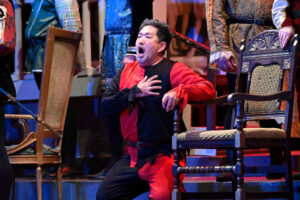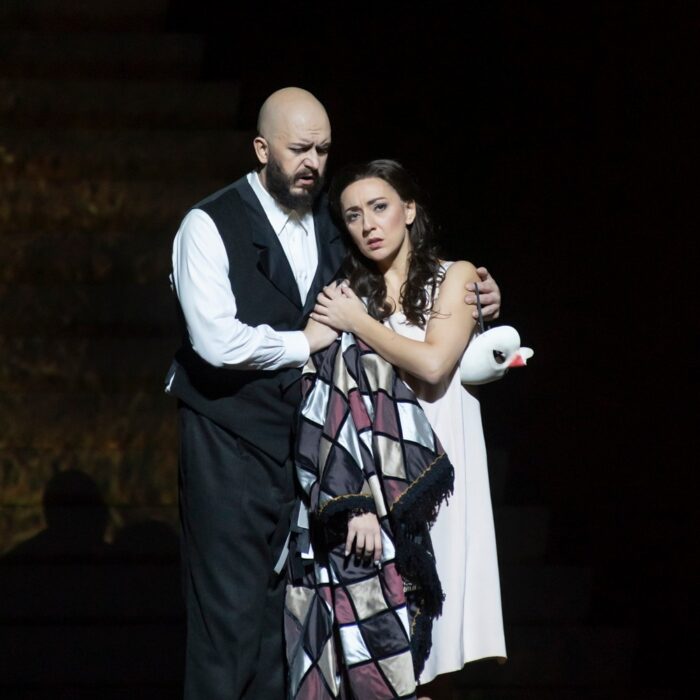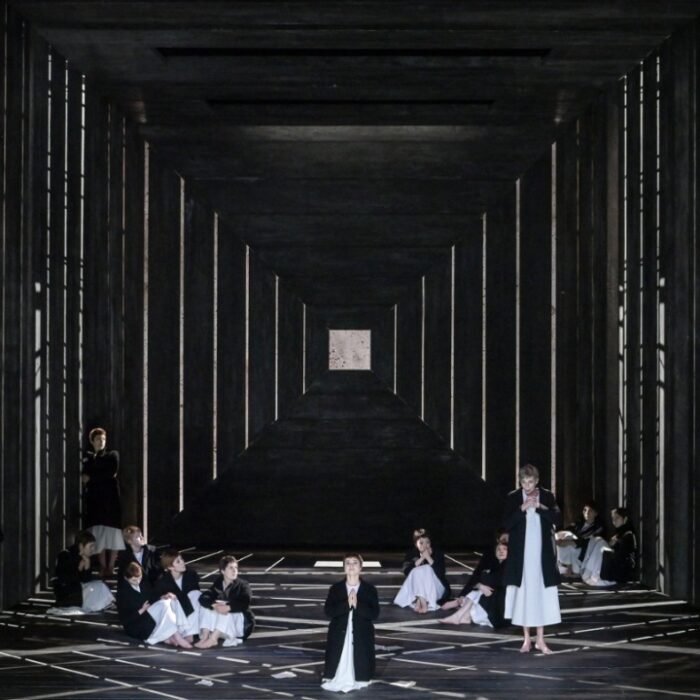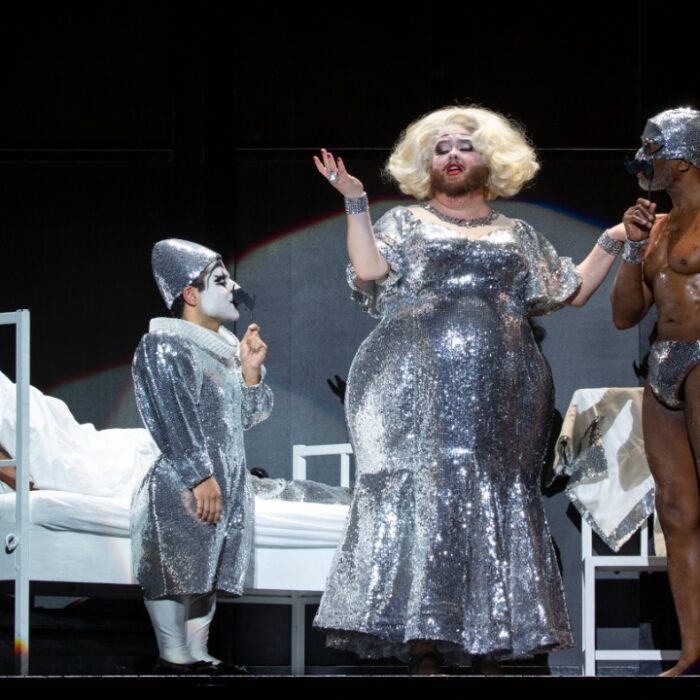
Regina Opera Company 2023-24 Review: Rigoletto
By Chris RuelCredit: Meg Goldman
Verdi’s “Rigoletto” was staged by Regina Opera Company in Brooklyn, New York, at Our Lady of Perpetual Help on Nov. 18, 2023. Impressive vocalists in the cast included Peter Hakjoon Kim in the title role, Veronica Mak as Gilda, and Christopher Trapani as the Duke of Mantua. Scott Jackson Wiley was on the podium, conducting the Regina Opera Orchestra. Helming the show was Sabrina Palladino.
Premiered in 1851, Verdi’s three-act opera is based on Victor Hugo’s “Le roi s’amuse” and depicts the tale of a cursed court jester, his daughter, and a womanizing duke. The opera features hits like ‘La donna è mobile’ and ‘Caro nome.’ These, when heard out of context, are catchy tunes. But when placed in situ, their power morphs to illustrate opposing characters. The former aria shows the carefree, hedonistic worldview of the Duke, while the latter shows Gilda’s innocence.
At the heart of the opera is “The Curse,” a malediction cast upon Rigoletto by Count Marone. The jester made the mistake of poking fun at Marone, who visited the ducal palace to complain about the Duke seducing his daughter. While the curse drives the plot, the themes explored by Verdi and Piave are not uncommon. Power, corruption, and love have been the thematic basis for innumerable works, operatic and otherwise.
Old-School Staging & Pit Performance
In their staging of “Rigoletto,” Regina Opera wisely abandons the trend of modernizing classical works for the sake of novelty. Instead, they faithfully adhere to the original setting in Renaissance-era Mantua when the Duke’s ugly behavior was not so shocking. Keeping the actual time and place was a solid choice. It removed the need for the audience to tease out the meaning inherent in a new setting, and it also avoided the inevitable anachronistic confusion that can arise when operas are dropped into the present day, recent past, or future. Seeing a canonical opera staged as intended was a breath of fresh air.
Maestro Wiley worked with an excellent band that exceeded expectations. He brought out both the tender and the violent within the score and did so gracefully, even peacefully – with a gentleness that kept the spotlight on the vocalists, not pit theatrics. There were no flubs to be heard. The timing was spot on, and the cohesion was tight. However, there was one issue early on that was soon rectified, and that was volume. The opening numbers pummeled the audience with sound. It wasn’t a cacophony, just overbearing and easily corrected.
Part of the joy of live theater is the unknown – anything can happen. The stage-right winds were surprised when Peter Hakjoon Kim as Rigoletto dropped his jester’s scepter while roughed up by the Duke’s toadies. The bauble slid from the stage and fell at the feet of the flutist, who was unharmed. (On a more serious note showing the perils of live performance, when the door to the inn was banged upon by Kim, the supports above it fell right where Hyong Sik Jo [Sparafucile] stood only moments before. Thankfully, Jo was some distance away when they dropped.)
Peter Hakjoon Kim’s Standout Performance
The standout vocalist was, by far and away, Kim. He parked and barked the least, using the entire stage and body to portray the character. His tone was solid and pleasant, his shading was outstanding, and his lyricism delightful. Kim’s Rigoletto took center stage, not Trapani’s Duke. That’s how it should be. The opera is titled “Rigoletto,” not “The Duke of Mantua.”
Kim’s interpretation removed some of the bitterness often seen in interpretations of the jester, making him a highly sympathetic character. Not that Kim played the fool as utterly pathetic. Fire in his characterization reflected Rigoletto’s anger and shame over his deformity, how the Court treated him, and the fear caused by the curse. He was as well-rounded as the hump on his back.
A Disappointing Duke
Christopher Trapani’s Duke was disappointing; his portrayal needed more arrogance and callousness – more self-absorbed swagger. If Rigoletto is sympathetically drawn, the Duke must be detestable, and that ugliness wasn’t there. When the Duke sings ‘La donna è mobile’ offstage as Gilda is murdered in his stead, the reaction from the audience should be disdain and a wish that Sparafucile had done the “honorable” thing and killed the Duke. Unfortunately, no such emotion was elicited. This wasn’t because the singing and all that comprised an excellent vocal outing was missing. Instead, it was the lack of presenting the Duke beyond that; there was too much standing and delivering. There was no fault to be found in his rendition of ‘La donna è mobile.’ It was solid, with excellent top notes, fantastic sustains, and depth of feeling, but it felt too much like he was performing a concert version of the opera.
Of no fault of his own, the Duke’s costuming was less than regal. The courtiers were dressed in Renaissance finery, while the Duke was sartorially slumming it, making his societal position seem less powerful. If the clothes make the man, the Duke’s costume missed the mark. Would such an arrogant character be okay with his Court looking more put together?
Questionable Casting
As Gilda, Veronica Mak had commendable moments – her performance of ‘Caro nome’ was well sung, and she appeared to inhabit the character believably. Likewise, her death scene. Kim and Mak had a gripping, sad, and genuine connection.
Associating Mak’s voice with the virtuous Gilda was a challenge; it was too overcharged. Gilda’s innocence calls for a light-as-a-feather voice that floats in the purity of heaven. Mak’s tone was more laser-like, penetrating, with sharp edges, rather than lifting with soft contours.
Mak was static while on stage, consistent with other cast members – a greater range of movement to coincide with her emotions wasn’t present.
Except for Kim, the arias were delivered to the audience rather than being integrated into the drama. Even as set pieces, these should connect those in the seats with the character’s thoughts. Instead, they felt disconnected from the larger story.
Despite the flaws, Regina Opera’s “Rigoletto” was entertaining and had moments when the heartstrings were tugged. Still, it wasn’t as powerful or satisfying as it could’ve been had the principal cast (minus Kim) spent equal effort on their acting as their vocal production.


